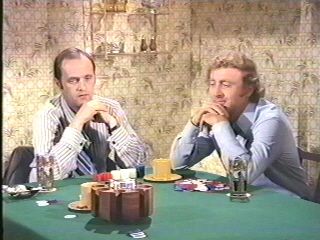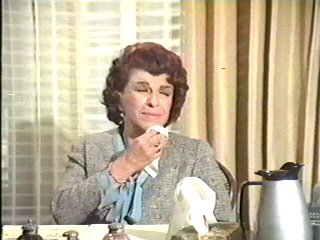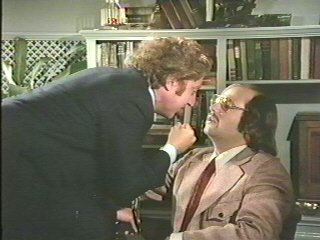
|
|
|
|
|
|
|
|
|
|
|
|
|
(1974) Director: Robert Moore
Back when I reviewed Dr. Cook's Garden, I lamented the state of the modern day made-for-TV movie. I complained about how made-for-TV movies today manage to look both glossy and cheap at the same time, but also how their screenplays now only seem to focus on a few specific subjects. But if I may be permitted to speak a little more on this, I would also like to point out that's it's not just the subject matter happens to be lame nowadays, but that the individuals now involved in the making of these made-for-TV movies don't seem to be particularly interested in doing a good job. Even when dealing with serious issues, at times it feels like the writers, directors, and actors are almost treating the whole project as a joke. There's no sense of conviction. I should point out that when you look at these writers, directors, and actors, you'll often see that these individuals were never that acclaimed in the first place. Why did the talent that was found in all those excellent made-for-TV movies in the '70s eventually evaporate? The number of likely explanations is numerous, though I think the one with the most impact was the explosion of cable in the 1980s. In fact, if you look at the modern made for cable movie, you will often see top talent in front of and behind the camera. It's doubtless that the cable channels manage to bring in all this talent because of the freedoms they offer that the networks can't or won't provide, like bigger budgets and a wider range of permitted subject matter. When I managed to get a copy of the '70s made-for-TV
movie Thursday's Game, I couldn't help but wonder: Could
a made for TV movie Despite having all this talent aboard, and (unlike most made-for-TV movies) receiving a video release Thursday's Game has strangely kept under the radar for all of this time. Which is a real shame, because it's a real gem; in fact, I feel it's one of the best made-for-TV movies of all time. It's a comedy, but it's not your typical comedy that creates wacky situations and wacky characters for laughs. Rather, this is a human comedy. The premise is one that's quite believable, something of the sort that is happening everywhere. The various situations the characters get in are situations we can relate to, and the humorous things that happen in them are things that very well could happen in these situations. And the various characters have individual quirks that make them funny people, yet these quirks are never overdone to make them into cartoon characters - you laugh, but at the same time you feel Brooks' compassion and sympathy for them. The main character are Harry Evers (Wilder) and Marvin Ellison (Newhart), two poker buddies who are each dealing with several problems in their personal lives when the movie opens. Harry is a television producer with a show on the brink of cancellation, and the prospect of finding a new job with his lack of experience is not good. He is too cowardly to talk about the problem with his wife (Burstyn); in fact, though he loves her very much, he is finding it very difficult to talk about anything with her these days, unable to get onto her wavelength. The situation is not any easier for Marvin; a fashion designer, he is desperate to come up with some popular clothing that will save him from the brink of bankruptcy. Not only that, but he is feeling confined by his marriage to his oblivious wife (Leachman), and is desperately looking for a way out. Only their weekly Thursday night poker game with their other buddies gives them any feeling of escape from their troubles. But when their latest game turns sour, and the two men find themselves thrown out of the group, that escape is gone. "I need my one night off," Marvin states as the men subsequently drown their sorrows at the local bar. Marvin has a plan: Both men will continue to tell their wives they are playing poker, but they will actually meet elsewhere each Thursday night. What will they do? "Anything we wanted to," Marvin simply replies. I remember that when I first saw this movie as a child
one weekend afternoon (and enjoying it even at that age), I was
confused about Harry and Marvin's decision But the movie doesn't get bogged down in sentiment and mushiness from all of this. Rather, it gives the movie a sweetness and warmth, as well as an feeling of realism running in the background. As it is, most of the scenes with Harry and Marvin together are intended more to deliver humor than anything else, and there always seems to be something to smile or laugh at. Take the time when Harry finally gets fired from his show, and goes to Marvin for help. He is shocked to find that Marvin is now doing well for himself, and vocally expresses his resentment. When Marvin finds out what happened and offers Harry a job, the still upset and self-pitying Harry calls the offer "tacky", adding that he feels "It's a sneaky way of getting in that you have a job and I don't!" Even though this isn't exactly likable behavior, you can't help but laugh; this is how people sometimes act when they get upset, which we've all seen (and even personally experienced) ourselves. Later, when Marvin discusses his big problem - he's become uncomfortable by the fact his wife is eight years older than he is - his reasoning of his dissatisfaction is so absurd that you don't have time to think of what a pig he is, because you are laughing so hard. "But... she's this middle-aged lady!" he concludes, and wants Harry's help in figuring out a way he can leave her without her getting angry or upset. That kind of twisted thinking is indeed what can be found with certain people in the real world. But for this ingenious character construction in Thursday's Game to really be pulled off, they needed actors who could handle two challenges - to not only act out this material in a funny way, but at the same time act like real people might do in similar circumstances. Wilder and Newhart are both wonderful, having a chemistry that fits that of an adult male friendship with all its highs and lows. While each of them have exhibited forms of extreme behavior in their other works - Wilder being manic or wimpish, and Newhart's stammering and introverted behavior - each of them tempers their familiar comic sides considerably here. Wilder makes Harry a soft-spoken and not terribly assertive man, but not a complete weakling. In fact, when pushed to his limit (such as the hilarious scene when he finds out his agent of four years has no idea who he is), Harry loses it - though Wilder is careful to curb his shrieking and body movements just enough so Harry's tantrum remains at an unexaggerated level. Likewise, Newhart avoids his familiar comic persona and plays it straight, except for one scene where Marvin takes his wife out to dinner so he can attempt to reveal he wants to leave her. It's quite understandable that Marvin begins stammering and finding it difficult to say what he wants, though Newhart is also careful not to overplay it. It's funny, because he ends up acting exactly like us when we have to reluctantly confess something to somebody. One other great performance I must also point out is
that of Ellen Burstyn. As her character's marriage to Harry begins to
crumble due to Now this isn't a perfect movie. The editor at times seems to have been as manic as Harry gets at times. Some scenes start up and abruptly end after a few seconds, and there are a few other scenes (like the midnight walk in the petting zoo) cut together so that the characters jump every few seconds into a new position, despite being deep in conversation. There are even a few nitpicks with Brooks' screenplay. Around the halfway point, Marvin disappears for a considerable amount of time, long enough that the title of Thursday's Game starts to get irrelevant. And oddly enough, while we get plenty of scenes involving Harry's life outside of Marvin, there is only one scene involving Marvin's life outside of Harry's. It's a real missed opportunity, because not only is Leachman in her two brief appearances extremely funny as Marvin's vain wife, it would have given us more of a feel of Marvin, whom we don't really get to learn very much about. But such problems do little to slow the movie down, because the movie is not only very funny (and touching), but constantly so; even during those shaky moments, there is something that tugs on your funny bone or your heart. Make a date for this "Thursday". Check for availability on Amazon (VHS) See also: The In-Laws, Pink Nights, Your Three Minutes Are Up |
 like this be made nowadays? Even
with today's elevated production costs, it wouldn't be particularly
expensive to make, since there are no special effects and it's not a
period piece. Despite that, I feel most likely that the networks would
ultimately pass, because in a multi-channel day and age it wouldn't be
"flashy" enough to instantly attract a number of people. In fact,
there's indication that the network that originally aired it got cold
feet; the movie had actually been made in 1972, but was subsequently
shelved for two years. And that's despite it having an unbelievable
amount of talent widely known even when it was made! There was movie
star Gene Wilder, who had made a name for himself up to that point with
movies like The Producers and Willy Wonka &
The Chocolate Factory. There was Bob Newhart, already famous
for his comedy routines and various appearances in movies and TV shows.
The cast also included Ellen Burstyn... Cloris Leachman... Valerie
Harper... Nancy Walker... and Rob Reiner, all famous at the time. And
the script was written by famous writer/producer James L. Brooks, who
had hit it big with The Mary Tyler Moore Show two years earlier.
like this be made nowadays? Even
with today's elevated production costs, it wouldn't be particularly
expensive to make, since there are no special effects and it's not a
period piece. Despite that, I feel most likely that the networks would
ultimately pass, because in a multi-channel day and age it wouldn't be
"flashy" enough to instantly attract a number of people. In fact,
there's indication that the network that originally aired it got cold
feet; the movie had actually been made in 1972, but was subsequently
shelved for two years. And that's despite it having an unbelievable
amount of talent widely known even when it was made! There was movie
star Gene Wilder, who had made a name for himself up to that point with
movies like The Producers and Willy Wonka &
The Chocolate Factory. There was Bob Newhart, already famous
for his comedy routines and various appearances in movies and TV shows.
The cast also included Ellen Burstyn... Cloris Leachman... Valerie
Harper... Nancy Walker... and Rob Reiner, all famous at the time. And
the script was written by famous writer/producer James L. Brooks, who
had hit it big with The Mary Tyler Moore Show two years earlier. not to tell their
wives. After all, if their wives were letting them go out and play
poker, why wouldn't they let them go out and do other things? Seeing it
again almost twenty years later, I was still a little mystified by
keeping their new arrangement a secret... though on the other hand,
I've never been married, so my thought process is not that of a married
man. Anyway, with that setup, a lesser movie would probably go the easy
way out and have the two men get into various wacky escapades every
subsequent Thursday night in an attempt to curb their boredom. Instead,
Thursday's Game shows the men doing things
most other men in their situation would end up doing - dining out,
talking walks in the park, and going to movies. And it's not like they
dive into this routine with smoothness and an already strong sense of
friendship; on their first night out, they remark how funny it is to
finally be seeing each other out of their poker game, and finding
themselves talking about things other than what may best be called "guy
stuff". And even as they start opening up more to each other, and their
friendship starts to grow, that doesn't mean that everything is smooth.
They sometimes exasperate each other with their individual ways of
thinking and logic, but their deepening bond has given them an unspoken
agreement to stick with and help each other out in their times of need.
not to tell their
wives. After all, if their wives were letting them go out and play
poker, why wouldn't they let them go out and do other things? Seeing it
again almost twenty years later, I was still a little mystified by
keeping their new arrangement a secret... though on the other hand,
I've never been married, so my thought process is not that of a married
man. Anyway, with that setup, a lesser movie would probably go the easy
way out and have the two men get into various wacky escapades every
subsequent Thursday night in an attempt to curb their boredom. Instead,
Thursday's Game shows the men doing things
most other men in their situation would end up doing - dining out,
talking walks in the park, and going to movies. And it's not like they
dive into this routine with smoothness and an already strong sense of
friendship; on their first night out, they remark how funny it is to
finally be seeing each other out of their poker game, and finding
themselves talking about things other than what may best be called "guy
stuff". And even as they start opening up more to each other, and their
friendship starts to grow, that doesn't mean that everything is smooth.
They sometimes exasperate each other with their individual ways of
thinking and logic, but their deepening bond has given them an unspoken
agreement to stick with and help each other out in their times of need.
 a decline of communication (from both
characters), she is the centerpiece of a few deadly serious scenes
where she momentarily puts down her mask of passive housewife and
shrieks out her feelings of pain and helplessness. It's quite a shock
to witness after laughing so much from the previous scenes, and quite a
testament to Burstyn's acting skills that we keep remembering this
picture of her upset face in the back of our minds even as we resume
laughing in the subsequent scenes. But it not all serious with Burstyn;
she gets some laughs with her wishy-washy behavior. She tells her
husband that he's not interested in her problems. Probably true... but
he tries all the same to do the right thing and ask her what's
troubling her - and she abruptly says she doesn't want to talk about
it. Classic - and still funny - human behavior. In fact, the humor of
this movie has remained so fresh that the screenplay could have been
written yesterday, with situations like job counselors (a hilarious
Nancy Walker) who get emotionally involved with their clients. Or
politically correct summer camps that are all about teachings kids to
communicate all their feelings, run by counselors who confess to
parents that their good reports concerning their children are partly
because of ego and to increase their chances of getting a good tip.
a decline of communication (from both
characters), she is the centerpiece of a few deadly serious scenes
where she momentarily puts down her mask of passive housewife and
shrieks out her feelings of pain and helplessness. It's quite a shock
to witness after laughing so much from the previous scenes, and quite a
testament to Burstyn's acting skills that we keep remembering this
picture of her upset face in the back of our minds even as we resume
laughing in the subsequent scenes. But it not all serious with Burstyn;
she gets some laughs with her wishy-washy behavior. She tells her
husband that he's not interested in her problems. Probably true... but
he tries all the same to do the right thing and ask her what's
troubling her - and she abruptly says she doesn't want to talk about
it. Classic - and still funny - human behavior. In fact, the humor of
this movie has remained so fresh that the screenplay could have been
written yesterday, with situations like job counselors (a hilarious
Nancy Walker) who get emotionally involved with their clients. Or
politically correct summer camps that are all about teachings kids to
communicate all their feelings, run by counselors who confess to
parents that their good reports concerning their children are partly
because of ego and to increase their chances of getting a good tip.